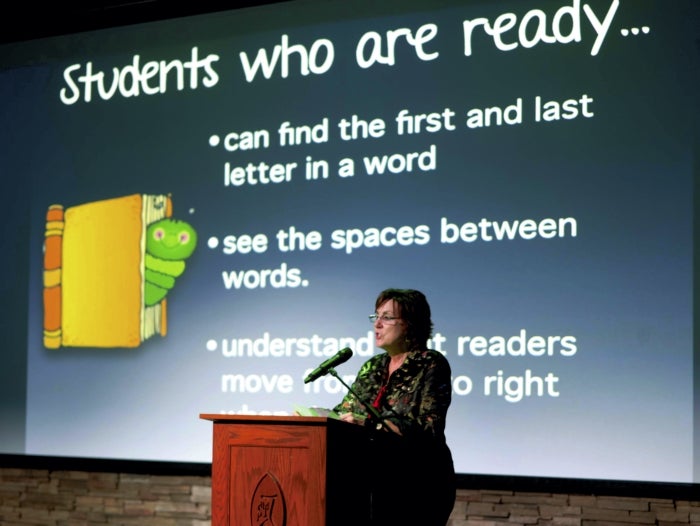Community members talk early literacy during Literacy Summit
Published 12:05 am Friday, November 20, 2015

- Rowan Salisbury School System Superintendent Dr. Lynn Moody speaks during the district’s second Literacy Summit, held Thursday at St John’s Lutheran Church’s new Peeler Hall and Faith Center. The summit brings together school personnel, business representatives and concerned citizens to brainstorm ideas to improve literacy for the residents, especially children, of Rowan County. Jon C. Lakey/Salisbury Post
It is going to take more than teachers to get Rowan-Salisbury students reading on grade level.
Teachers, principals, government officials, school system administration, college administration and other community members all gathered for the second annual Rowan-Salisbury schools Literacy Summit.
The first summit occurred in September of last year. That summit focused on establishing community hotspots, or areas that provide Wi-Fi for digital devices.
This year, the focus was put on early learning and literacy. The speakers talked about how beneficial it was to get children involved in reading during their first few years of life.
Jennifer Flynn, a local attorney at Kluttz, Reamer, Hayes, Adkins and Carter, LLP, spoke to the crowd about getting involved with programs that encourage literacy, like the Campaign for Grade Level Reading and Rowan Reads, a reading promotion initiative of the Rowan Public Library and the Library Foundation.
“There can be no room for doubt that a child’s earliest years have a lasting impact on later learning, health and success, and how we address these crucial years impacts our national security, safety and economic well-being,” she said.
According to a flyer from the First 2000 Days organization, 70 percent of Americans from the ages of 17 to 24 cannot meet the military’s eligibility requirements. That can be because the individual is not fit for duty, but it can also be because they do not have a high school diploma or they have a criminal background that prevents them from joining.
The flyer also states that 80 million-90 million adults do not have the basic education and communication skills required to get and advance in jobs. And at-risk children who do not get a high-quality early childhood education were 70 percent more likely to be arrested for a violent crime by 18 years old.
Flynn also shared some literacy facts about Rowan County with the crowd. She said a little over 50 percent of third-graders are reading at grade level, but 65 percent of children are not ready when they go into kindergarten.
Lisa Finaldi, community engagement leader from the North Carolina Early Childhood Foundation, gave a speech titled “The First 2000 Days and Early Literacy.” She talked about how good learning experience during the 2,000 days between birth and kindergarten can have a lasting impact on the brain.
“While we’re born with the cells in our brains, it’s about our experiences and our everyday interactions with people that build our brains,” she said.
Finaldi also talked about the three things that can lead to children achieving grade level reading.
“It’s good health, it’s strong families, and it’s really having high quality early learning experiences, whether they’re in you’re home, at a childcare center, in church when you’re with your family, these are all the experiences that are critical for our child’s development,” she said.
Above all, the speakers talked about the importance of the community getting involved to help get more students reading.
“We can’t rely on one family or one church or one school or one person. The only way we can really get at this problem is if everybody’s in,” Finaldi said.
After the speakers, the audience split up into groups of 10 or less to discuss some questions about early literacy, including what they could do to support early literacy in the community and who needs to be involved in the support.
Many groups talked about bringing the resources to the students instead of having the students find some way to get to the resources.
Other groups talked about getting pediatricians, dentists and other professionals involved in talking about literacy with their patients, and even offering them books to take home.
After the discussions, the groups came back together for a final word from Superintendent Dr. Lynn Moody. She said she would go over all of the suggestions, compile and compress them and send them back to the attendees.
Moody said it is important to get the community involved in literacy because it is an important foundation for learning.
“Reading is fundamental to success in life,” she said. “If you can read, you can teach yourself and you always have access to information. So it’s the hub. It’s the crux.”
Contact reporter Amanda Raymond at 704-797-4222.


